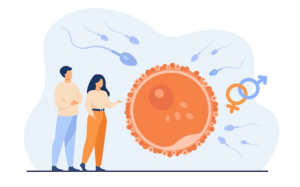Introduction
How can I restore my zero sperm count? Zero sperm count, also known as azoospermia, is a condition where a man’s semen contains no sperm. It affects about 1% of men and can lead to infertility. However, the good news is that in many cases, azoospermia can be treated or managed. In this article, we will explore the causes of zero sperm count, possible treatments, and natural ways to improve sperm production.
Understanding Zero Sperm Count (Azoospermia)
Azoospermia is classified into two main types:
- Obstructive Azoospermia – The sperm is produced in the testicles but cannot reach the semen due to a blockage in the reproductive tract.
- Non-Obstructive Azoospermia – The testicles do not produce enough sperm due to hormonal imbalances, genetic conditions, or other health issues.
Common Causes of Zero Sperm Count
Several factors can contribute to azoospermia, including:
- Hormonal Imbalance – Low levels of testosterone or problems with the pituitary gland.
- Genetic Conditions – Disorders like Klinefelter syndrome or Y-chromosome microdeletions.
- Obstruction in the Reproductive Tract – A blockage in the vas deferens or epididymis.
- Infections – STDs or other infections affecting the reproductive system.
- Varicocele – Swelling of the veins in the testicles that affects sperm production.
- Exposure to Toxins – Pesticides, radiation, or heavy metals can impact sperm health.
- Lifestyle Factors – Smoking, alcohol, drug use, and obesity can lead to a lower sperm count.
- Medical Treatments – Chemotherapy, radiation therapy, or certain medications can harm sperm production.
How to Restore Zero Sperm Count?
The treatment for azoospermia depends on its cause. Here are some options:
1. Lifestyle Changes to Improve Sperm Production
Adopting a healthy lifestyle can significantly boost sperm count:
- Eat a Nutritious Diet – Foods rich in zinc, folic acid, and antioxidants help improve sperm health. Include:
- Leafy greens (spinach, kale)
- Nuts and seeds (walnuts, flaxseeds)
- Fish rich in omega-3 (salmon, sardines)
- Eggs and dairy products
- Exercise Regularly – Engaging in moderate exercise helps maintain a healthy weight and improve testosterone levels.
- Avoid Smoking and Alcohol – Both can damage sperm cells and lower testosterone levels.
- Manage Stress – High stress leads to hormonal imbalances that affect sperm production.
- Get Enough Sleep – Poor sleep quality can decrease sperm count and testosterone levels.
- Avoid Toxins – Limit exposure to chemicals, pesticides, and heat (such as saunas or hot baths).
2. Medical Treatments for Zero Sperm Count
If lifestyle changes are not enough, medical treatments may be necessary:
Hormonal Therapy
- If your azoospermia is due to a hormonal imbalance, doctors may prescribe testosterone replacement therapy or other hormonal treatments to regulate levels and boost sperm production.
Surgical Procedures
- Varicocele Surgery – If varicoceles (swollen veins in the testicles) are causing low sperm production, surgery can help restore normal function.
- Vasectomy Reversal – If a previous vasectomy is the cause of azoospermia, surgery can reconnect the vas deferens.
- Sperm Retrieval Procedures – Techniques like TESA (Testicular Sperm Aspiration) or PESA (Percutaneous Epididymal Sperm Aspiration) can extract sperm directly from the testicles.
Treating Infections
- If infections are causing azoospermia, antibiotics and anti-inflammatory medications can help restore sperm production.
3. Assisted Reproductive Techniques (ART)
If natural conception is not possible, assisted reproductive techniques can help:
- In Vitro Fertilization (IVF) – Sperm is combined with an egg in a lab and implanted into the female partner’s uterus.
- Intracytoplasmic Sperm Injection (ICSI) – A single sperm is injected directly into an egg to improve the chances of fertilization.
- Sperm Donor Options – If sperm production cannot be restored, using donor sperm can be an alternative.
4. Herbal and Natural Remedies
Some herbs and supplements are believed to improve sperm count naturally:
- Ashwagandha – Helps reduce stress and improve testosterone levels.
- Maca Root – Known to enhance fertility and sperm quality.
- Tribulus Terrestris – Improves libido and sperm motility.
- Fenugreek Supplements – Boosts testosterone levels and sperm health.
- Coenzyme Q10 & Vitamin C – Powerful antioxidants that protect sperm from damage.
When to See a Doctor?
If you have been trying to conceive for over a year without success, it’s best to consult a fertility specialist. They will conduct tests such as:
- Semen analysis to check sperm count and quality.
- Hormone tests to identify imbalances.
- Genetic testing to rule out hereditary conditions.
- Ultrasound to check for blockages or varicocele.
Final Thoughts
Zero sperm count does not mean the end of fatherhood. With the right treatment and lifestyle changes, many men can restore their fertility. Whether through natural remedies, medical treatments, or assisted reproductive techniques, there is hope for men with azoospermia. If you are facing this condition, consult a doctor for the best treatment plan tailored to your needs.
FAQs
1. Can azoospermia be reversed?
Yes, in many cases, azoospermia can be treated through lifestyle changes, surgery, or medical interventions.
2. How long does it take to restore sperm count?
It depends on the cause and treatment. Natural remedies and lifestyle changes may take 3–6 months, while medical treatments may have faster results.
3. Is there a permanent cure for zero sperm count?
If azoospermia is due to an obstruction, surgery can permanently restore fertility. If caused by a genetic condition, assisted reproductive techniques may be the best option.
By following the right steps and seeking medical advice, men with zero sperm count can improve their chances of fathering a child.


